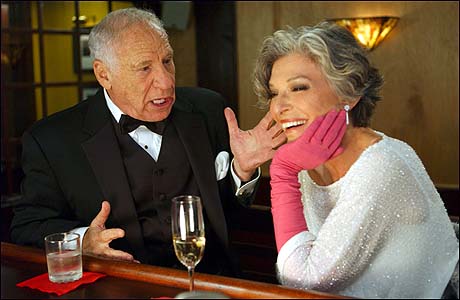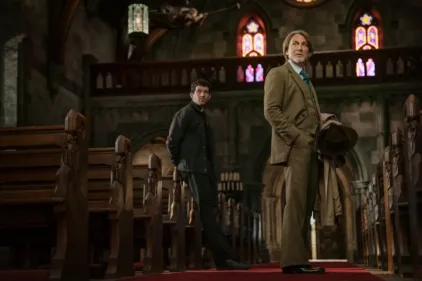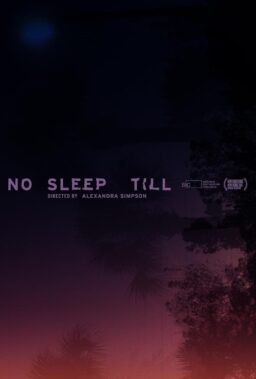“And here’s to you, Mrs. Robinson / Jesus loves you more than you will know.”
— “Mrs. Robinson” by Simon and Garfunkel
Anne Bancroft, who won an Academy Award for one performance and everlasting fame for another, died Monday in New York. She was 73.
Her Oscar came for “The Miracle Worker” (1962), in which she played Annie Sullivan, the teacher who used touch to reach into the world of the blind and deaf Helen Keller. Her fame came for “The Graduate” (1967), in which she played Mrs. Robinson, a married woman who used her worldly sexuality to seduce a young college graduate (Dustin Hoffman). The name “Mrs. Robinson” became synonymous with sexy older women, not least because of the famous Simon and Garfunkel song which celebrated the character.
Miss Bancroft, who was married for more than 40 years to writer, director and comedian Mel Brooks, died in Mount Sinai Medical Center in New York City. The cause of death was uterine cancer.
After “The Miracle Worker,” Bancroft was nominated for four more Oscars, playing an emotionally tormented wife in “The Pumpkin Eater” (1964), Mrs. Robinson in “The Graduate,” a ballet dancer who chose her career over a personal life in “The Turning Point” (1977) and a mother superior in “Agnes of God” (1985). She also had great success on the stage, where she won Tony Awards for her work in “Two for the Seesaw” and “The Miracle Worker.”
Arthur Penn, who directed her in both of those plays and in the film “The Miracle Worker,” told the New York Times: “More happens in her face in 10 seconds than happens in most women’s faces in 10 years.”
That was certainly the case in “The Graduate,” where as the bored wife of a profoundly conventional suburbanite, she boldly seduces Benjamin Braddock, the Hoffman character. The plot grows emotionally hazardous when he later falls in love with her daughter (Katharine Ross). A still photo of Benjamin regarding Mrs. Robinson’s leg in a nylon stocking became an icon of movie imagery.
Although much was made of the generation gap, Bancroft was only 36 when the movie was made, and Hoffman was 30. Revisiting the movie in 1997, I realized that it played completely differently for me from the way it had 30 years earlier. Then I had found Mrs. Robinson “magnificently sexy, shrewish and self-possessed enough to make the seduction convincing.”
After the 1997 viewing I wrote: “Well, here is to you, Mrs. Robinson: You’ve survived your defeat at the hands of that insufferable creep, Benjamin, and emerged as the most sympathetic and intelligent character in ‘The Graduate.’ ” I added: “Mrs. Robinson is the only person in the movie who is not playing old tapes. She is bored by a drone of a husband, she drinks too much, she seduces Benjamin not out of lust, but out of kindness or desperation. Makeup and lighting are used to make Anne Bancroft look older. But there is a scene where she is drenched in a rainstorm; we can see her face clearly and without artifice, and she is a great beauty. She is also sardonic, satirical and articulate — the only person in the movie you would want to have a conversation with.”
I ran into Miss Bancroft and Brooks shortly after writing that re-review, and told her of my conviction that Mrs. Robinson was the most intriguing character in the movie. “Of course she is,” Bancroft smiled. “Why do you think I took the role?”
Her long-running marriage with Brooks was a high-wire act between two quick-witted verbal acrobats. Brooks cast her in cameos in his “Blazing Saddles” (1974) and “Silent Movie” (1976); they co- starred in Alan Johnson’s “To Be Or Not to Be” (1983), and Brooks cast her as a psychic seer in “Dracula: Dead and Loving It” (1995).
In “Silent Movie,” her brief but scene-stealing moment comes when she crosses her eyes. In an interview with Brooks, I observed that she seemed able to cross either eye separately.
“How did you get that effect?” I asked. “Effect?” Brooks said. “That was no effect, that was Annie! She can really do that! That’s why I married her. Twelve years ago, we’re sitting in 21, I’m in love with her, I ask, ‘Come on, how am I doin’?’ And in reply, she crosses her eyes like that. Now I know it’s love. For years, I’ve been searching for the right role for Annie. Not ‘The Miracle Worker.’ Not ‘The Pumpkin Eater.’ Not Mrs. Robinson. The right role, where she can cross her eyes!”
George Anthony, chief of entertainment programming for the CBC, remembers that Bancroft and Brooks were a “genuine bonafide love match, in the early years almost as famous for their public battles as Elizabeth Taylor and Michael Todd.” He recalls one of their fights when he grabbed her arm and she pulled away from him. Anthony’s story:
“‘Don’t you dare touch my instrument’!” she raged, in her highest Actors Studio dudgeon.
“‘Oh, so this is your instrument?’
“‘Yes. This is my instrument!’
“‘Okay. Play ‘Melancholy Baby’.”
She was Italian, he was Jewish, together they were electric. In person, she was as funny as he was, but he was always on; she sometimes took a break. Their careers had ups and downs. Brooks had a box-office slump with such later films as “Spaceballs” (1987) and “Life Stinks” (1991), then came back with a musical version of his 1968 comedy “The Producers” that became one of the biggest hits in Broadway history.
She started in the movies, as she was fond of observing, at the bottom of the ladder, claiming to have played the title role in “Gorilla at Large” (1954). After more forgettable roles, she moved to Broadway for her two Tony-winning performances and other successes, and returned to Hollywood much further up the ladder. She appeared in some 65 films and made-for-TV movies and miniseries, notably as Jenny Churchill in “Young Winston” (1972), Greta Garbo’s biggest fan in “Garbo Talks!” (1984), a book lover in “84 Charing Cross Road” (1987), the title role in “The Oldest Living Confederate Widow Tells All” (1994), and a rich Italian princess in “Up at the Villa” (2000).
When the stage version of “The Producers” opened in Chicago before moving to Broadway, it was clear on opening night that the musical would be a huge hit. At the party afterward, I asked her what she was doing. “I keep retiring,” she said. “Then I get offered something. Then I retire again.
She was born Anna Maria Italiano in 1931 in the Bronx, and retained a Bronx accent as an option in her acting arsenal. Beneath her glamorous appearance, Arthur Penn said, “she’s heavy-duty Bronx.”
She acted for a brief time as Anne Marno before choosing the stage name Bancroft, the AP reported, “because it sounded dignified.” She met Brooks in 1964 during the taping of a Perry Como TV special.
Broadway theaters will dim their marquee lights in her honor tonight.
Contributing: AP, Reuters












